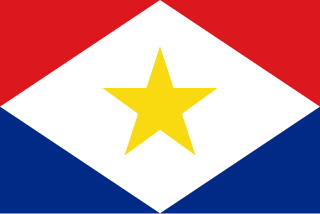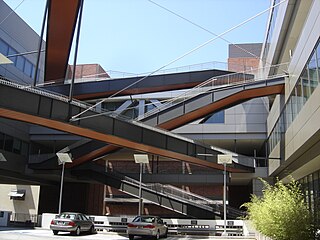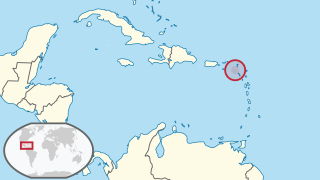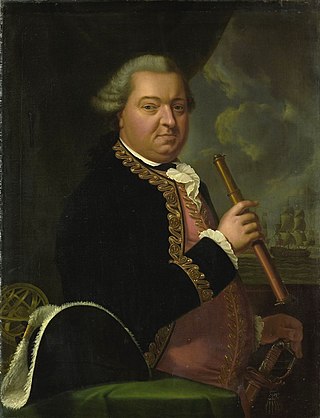Related Research Articles

The Netherlands Antilles was a constituent country of the Kingdom of the Netherlands. The country consisted of several island territories located in the Caribbean Sea. The islands were also informally known as the Dutch Antilles. The country came into being in 1954 as the autonomous successor of the Dutch colony of Curaçao and Dependencies. The Antilles were dissolved in 2010. The Dutch colony of Surinam, although it was relatively close by on the continent of South America, did not become part of the Netherlands Antilles but became a separate autonomous country in 1954. All the island territories that belonged to the Netherlands Antilles remain part of the kingdom today, although the legal status of each differs. As a group they are still commonly called the Dutch Caribbean, regardless of their legal status. People from this former territory continue to be called Antilleans in the Netherlands.

The flag of the Netherlands Antilles was white, with a horizontal blue stripe in the center, one-third of the flag's hoist, superimposed on a vertical red stripe of the same width, also centered; six white, five-pointed stars are arranged in a hexagon pattern in the center of the blue band, their points up. It was adopted on 19 November 1959.

Saba is a Caribbean island and the smallest special municipality of the Netherlands. It consists largely of the active volcano Mount Scenery, which at 887 metres (2,910 ft) is the highest point of the entire Kingdom of the Netherlands. The island lies in the northern Leeward Islands portion of the West Indies, southeast of the Virgin Islands. Together with Bonaire and Sint Eustatius it forms the BES islands, also known as the Caribbean Netherlands.

Sint Eustatius, known locally as Statia, is an island in the Caribbean. It is a special municipality of the Netherlands.

The SSS islands, locally also known as the Windward Islands, is a collective term for the three territories of the Dutch Caribbean that are located within the Leeward Islands group of the Lesser Antilles. In order of population size, they are: Sint Maarten, Sint Eustatius and Saba. In some contexts, the term is also used to refer to the entire island of Saint Martin, alongside Sint Eustatius and Saba.

.an was the Internet country code top-level domain (ccTLD) for the former Netherlands Antilles. It was administered by the University of the Netherlands Antilles. The domain was phased out after the Netherlands Antilles were dissolved in 2010. As of November 2010 the .an domain remained live with over 800 domains registered under .an, including secondary levels. On 31 July 2015, use of the domain was discontinued.
The Democratic Party is a political party in Sint Eustatius with two seats in the 5-seat island council. In 2011, the party obtained 2 seats in the first elections after Sint Eustatius became part of the Netherlands upon the dissolution of the Netherlands Antilles in 2011. However, their Island Council representative Reuben Merkman left the DP in 2014 and became an independent council member.

The Netherlands Antilles was an autonomous Caribbean country within the Kingdom of the Netherlands. It was dissolved on 10 October 2010.

The California NanoSystems Institute (CNSI) is an integrated research center operating jointly at UCLA and UC Santa Barbara. Its missions are to foster interdisciplinary collaborations for discoveries in nanosystems and nanotechnology; train the next generation of scientists, educators and technology leaders; and facilitate partnerships with industry, fueling economic development and the social well-being of California, the United States and the world.

The Caribbean Netherlands are the three public bodies of the Netherlands that are located in the Caribbean Sea. They consist of the islands of Bonaire, Sint Eustatius and Saba, although the term "Caribbean Netherlands" is sometimes used to refer to all of the islands in the Dutch Caribbean. In legislation, the three islands are also known as Bonaire, Sint Eustatius and Saba or the BES islands. The islands are currently classified as public bodies in the Netherlands and as overseas countries and territories of the European Union; thus, European Union law does not automatically apply.
.bq is designated—but not in use—as the Internet country code top-level domain (ccTLD) for Bonaire, Sint Eustatius and Saba following the assignment on December 15, 2010, by the ISO 3166 Maintenance Agency of BQ as the ISO 3166-1 alpha-2 to the area. This decision followed the dissolution of the Netherlands Antilles and new status of the Caribbean Netherlands as public bodies of the Netherlands on October 10, 2010.

The Dutch Caribbean are the territories, colonies, and countries, former and current, of the Dutch Empire and the Kingdom of the Netherlands in the Caribbean Sea. They are in the north and south-west of the Lesser Antilles archipelago.
Robert ″Bob″ Powell is an American herpetologist. His main research interest is in the herpetofauna of the Caribbean.

Islam is a minority religion in the Netherlands Antilles. There are about 2,500 Muslims in the Islands, 1000 of which are in the Caribbean Netherlands, or 0.31% of the population. Most Muslims are emigrants from Lebanon, Syria and Suriname.
Same-sex marriage in Bonaire, Sint Eustatius and Saba has been legal since 10 October 2012, the effective date of legislation passed by the States General of the Netherlands enabling same-sex couples to marry.

Lesbian, gay, bisexual, and transgender (LGBT) rights in Bonaire are very progressive by Caribbean standards. Bonaire forms part of the Caribbean Netherlands and is a special municipalitiy of the Netherlands. Both male and female same-sex sexual activity are legal in Bonaire, with same-sex marriage and adoption being legal since 2012. In addition, discrimination on the basis of "heterosexual and homosexual orientation" is outlawed.

Lesbian, gay, bisexual, and transgender (LGBT) rights in Sint Eustatius are quite progressive by Caribbean standards. Sint Eustatius forms part of the Caribbean Netherlands and is a special municipalitiy of the Netherlands. Both male and female same-sex sexual activity are legal in Sint Eustatius, with same-sex marriage, registered partnership, and adoption being legal since 2012. In addition, discrimination on the basis of "heterosexual and homosexual orientation" is outlawed.

Lesbian, gay, bisexual, and transgender (LGBT) rights in Saba are very progressive by Caribbean standards. Saba forms part of the Caribbean Netherlands and is a special municipality of the Netherlands. Both male and female same-sex sexual activity are legal in Saba, with same-sex marriage and adoption being legal since 2012. In addition, discrimination on the basis of "heterosexual and homosexual orientation" is outlawed.

Willem Krul, was a vice-admiral in the Dutch Navy in the latter 18th century, and then commander of the Dutch ship of the line Mars, during the American Revolutionary War. He was also known as Adrianus Hendrik Willem Krul. After serving in various assignments about the European Atlantic coast Krul served in his final naval assignment at Saint Eustatius, a Dutch possession in the West Indies, during which time he lost his life while engaged in a naval battle with the British, making him a national hero in the Netherlands.

The Godet African Burial Ground is an unmarked historical burial ground for enslaved African men, women and children located at the southwest coast of Sint Eustatius, Dutch Caribbean. The burial ground was part of the former Godet plantation on the island.
References
- ↑ Hydro-International, Archive, October 2014, Volume 16, Number 7, Research on Varied Caribbean Geophysical Aspects, The Caribbean Netherlands Science Institute at St Eustatius, by Johan Stapel Accessed 2015.5.23